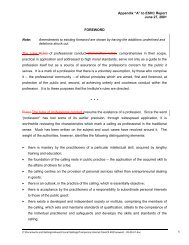CICA 20 QUESTIONS Strategy - Institute of Chartered Accountants ...
CICA 20 QUESTIONS Strategy - Institute of Chartered Accountants ...
CICA 20 QUESTIONS Strategy - Institute of Chartered Accountants ...
- No tags were found...
You also want an ePaper? Increase the reach of your titles
YUMPU automatically turns print PDFs into web optimized ePapers that Google loves.
These detailed questions (i.e. 2-6) specify the salient components thatdefine an organization’s complete strategy. As such, Boards need toconsider them as a group when seeking to describe the strategy fortheir particular organization.Interestingly, questions 2-6 are sometimes summarized in the moregeneral query <strong>of</strong> "what business are we in?" But, experience todaysuggests that using such an approach is now perhaps much too vagueto gain the sort <strong>of</strong> insights that directors are looking for. Nevertheless,whatever approach is taken, it is vital that there be agreement bothamong the directors - and between the Board and management –concerning how they choose to define and articulate theirorganization’s strategy. This is required in order to establish clearlywhich decisions are strategic versus those that are not.In fact, failure to do so will most likely result in poor communication,confusion and even conflict whenever the topic <strong>of</strong> the organization’sstrategy is raised.Thus, one important contextual question that everydirector must ask early on with respect to assessing and approving theorganization’s strategy is:7. Is the definition <strong>of</strong> strategy in this organization shared byall directors and management?The definition <strong>of</strong> strategy provided above is very robust and covers avariety <strong>of</strong> circumstances. It can be used to describe the organization’sstrategy that is currently in place - or one that is being proposed for thefuture. It can also be used to describe two terms which are <strong>of</strong>ten usedinterchangeably but which sometimes have quite different meanings:‘business strategy’ and ‘corporate strategy’. Generally speaking, thedistinction between these two concepts turns largely on the breadth<strong>of</strong> a company’s scope or domain <strong>of</strong> operations.More specifically, the definition <strong>of</strong> what constitutes "a business" istypically regarded as a specific product or service <strong>of</strong>fered to aspecific type <strong>of</strong> customer in a specific location.“ If you don’t know whereyou are going, you’ll probably wind upsomeplace else.Anon”Consequently, when the scope or domain <strong>of</strong> a company’s operationsis relatively narrow, there is virtually no difference between theorganization’s business and corporate strategies.They are synonymous.Directors <strong>of</strong> large diversified companies, therefore, need to ask:8. What are the major business strategies making up theoverall corporate strategy?As a company diversifies (i.e., adds additional major products, servicesand/or types <strong>of</strong> customers), there may be multiple business strategiesat play (each defined using the strategic components provided inquestions 2 though 6), which collectively represent an ‘overall strategy’different from the individual business pieces. It is at this point that thecorporate strategy (i.e. the collective strategy) becomes somethingseparate and distinct from the individual business strategies.In these latter circumstances, the Board should focus its attentionprimarily on the corporate strategy.The Board should only becomeinvolved with assessing and approving business strategies when theyrepresent major changes to the overall corporate direction – such as,when a new business is added/acquired or an existing businessclosed/sold. Nevertheless, it is still advisable that directors be informed<strong>of</strong> and review the major business strategies <strong>of</strong> the corporation on anongoing basis so as to better understand their impact on the wholeorganization.2
















